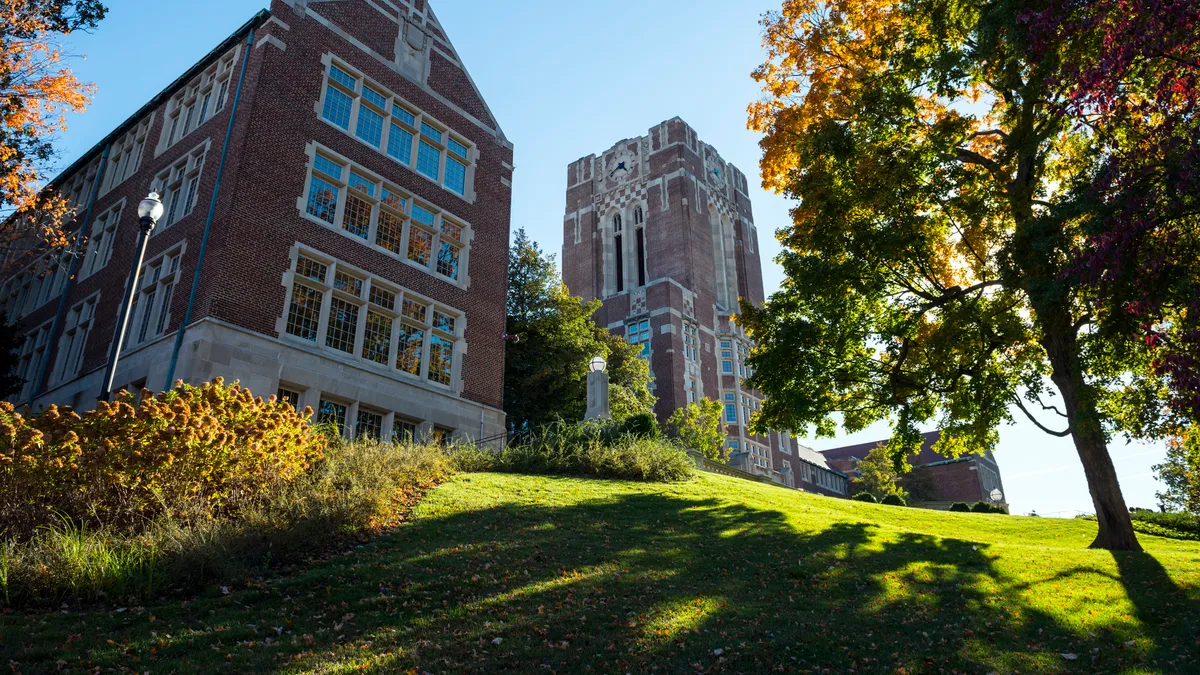Dive Brief:
- Tennessee high school students in the top 10% of their class will be guaranteed admission to a University of Tennessee System college under a new policy approved Friday.
- The system will also guarantee spots for high school students with a GPA of 4.0 or higher. And all of the system’s campuses except for the flagship — University of Tennessee, Knoxville — will accept students who earn an ACT composite score of at least 23 along with a 3.2 or higher GPA.
- The changes mean to entice Tennessee students to enroll in the state’s public colleges. During their meeting Friday, system officials bemoaned losing students to other southern states, such as Georgia, Florida and Alabama.
Dive Insight:
The University of Tennessee System hopes the policies will boost enrollment across its four colleges at a time when many institutions face heightened competition over students. Higher education leaders have long braced for an expected dropoff in high school graduates starting around 2025 due to declining birth rates during the Great Recession.
“We have, as everyone knows, a shrinking pool of high school graduates,” Randy Boyd, the University of Tennessee System’s president, said during Friday’s meeting. “Because of that, we need to be more proactive, we need to be more aggressive at attracting that shrinking pool.”
College-going rates are also lower than they once were in Tennessee — a problem mirrored across much of the nation since the coronavirus pandemic began.
Around 54% of Tennessee’s high school class of 2022 immediately entered college after earning their diploma, according to a June report from the state’s higher education commission.
That marked a small improvement over the prior year’s cohort. But the college-going rate was still about 10 percentage points lower than the class of 2015 — roughly 64% of which enrolled in college after high school.
Officials hadn’t expected the college-going rate to decline, John Compton, chair of the system’s governing board, said during Friday’s meeting. That’s created “two headwinds” — fewer high school graduates and less of them opting for higher education, Compton said.
Similar admissions policies exist in other states. Texas launched its guaranteed admissions program for the top 10% of high schoolers in 1998, a couple years after the state banned race-conscious admissions.
At the time, Texas policymakers hoped the venture would foster racial and geographic diversity in public colleges. However, recent research shows the program resulted in “little to no equity-producing changes” at the state’s public flagships. It did, however, increase the likelihood of non-suburban high schools sending their students to those institutions.
The Texas plan has also been scaled back. The University of Texas at Austin since 2019 only admits the top 6% of high school class members after applications to the selective college swelled.
The University of Tennessee System’s guaranteed admissions plan goes beyond Texas’ by also guaranteeing spots to students with qualifying GPA and ACT composite scores.
But board members didn’t extend this admissions pathway to its flagship, UT Knoxville, partly over concerns about capacity.
“I’d love to learn from other states who had to pull back on promises made,” said Jamie Woodson, a system board member. “I’d love to make promises and keep our promises.”
UT Knoxville will calculate a student’s weighted GPA using 16 core academic subjects. Other campuses may choose to use students’ cumulative GPAs, according to the policy language.















